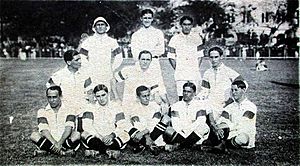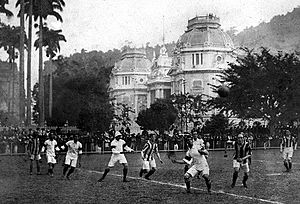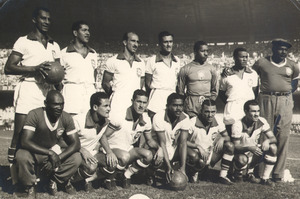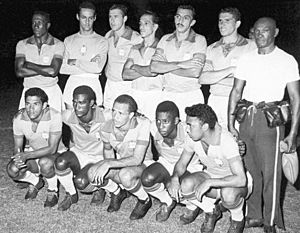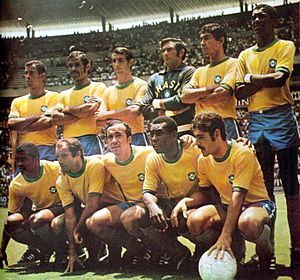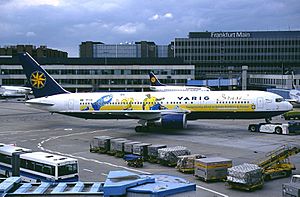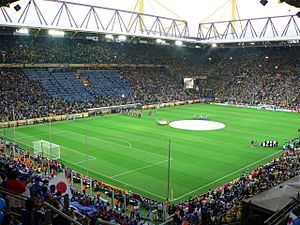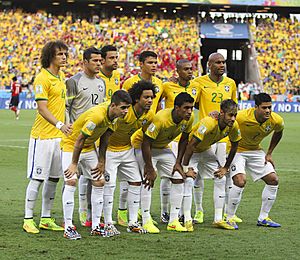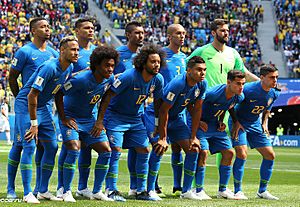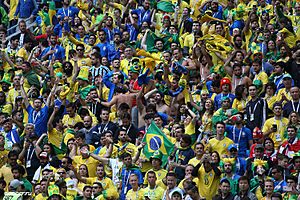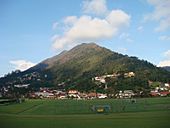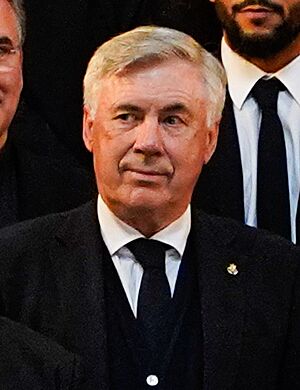Brazil national football team facts for kids
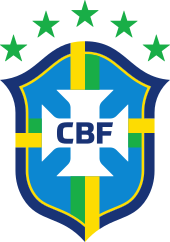 |
|||||||||||||||||||||||||||||||||||||||||||||||||||||||||||||||||||||||||||||||||||||||||||||||||||||||||||||||||||||||||||||||||||||||||||||||||||||||||||||||||||||||
| Nickname(s) | Seleção (The Selection) Canarinho (Little Canary) Amarelinha (Little Yellow) Verde-Amarela (Green-Yellow) Scratch (The Scratch) |
||||||||||||||||||||||||||||||||||||||||||||||||||||||||||||||||||||||||||||||||||||||||||||||||||||||||||||||||||||||||||||||||||||||||||||||||||||||||||||||||||||||
|---|---|---|---|---|---|---|---|---|---|---|---|---|---|---|---|---|---|---|---|---|---|---|---|---|---|---|---|---|---|---|---|---|---|---|---|---|---|---|---|---|---|---|---|---|---|---|---|---|---|---|---|---|---|---|---|---|---|---|---|---|---|---|---|---|---|---|---|---|---|---|---|---|---|---|---|---|---|---|---|---|---|---|---|---|---|---|---|---|---|---|---|---|---|---|---|---|---|---|---|---|---|---|---|---|---|---|---|---|---|---|---|---|---|---|---|---|---|---|---|---|---|---|---|---|---|---|---|---|---|---|---|---|---|---|---|---|---|---|---|---|---|---|---|---|---|---|---|---|---|---|---|---|---|---|---|---|---|---|---|---|---|---|---|---|---|---|---|
| Association | Confederação Brasileira de Futebol (CBF) | ||||||||||||||||||||||||||||||||||||||||||||||||||||||||||||||||||||||||||||||||||||||||||||||||||||||||||||||||||||||||||||||||||||||||||||||||||||||||||||||||||||||
| Confederation | CONMEBOL (South America) | ||||||||||||||||||||||||||||||||||||||||||||||||||||||||||||||||||||||||||||||||||||||||||||||||||||||||||||||||||||||||||||||||||||||||||||||||||||||||||||||||||||||
| Head coach | Carlo Ancelotti | ||||||||||||||||||||||||||||||||||||||||||||||||||||||||||||||||||||||||||||||||||||||||||||||||||||||||||||||||||||||||||||||||||||||||||||||||||||||||||||||||||||||
| Captain | Marquinhos | ||||||||||||||||||||||||||||||||||||||||||||||||||||||||||||||||||||||||||||||||||||||||||||||||||||||||||||||||||||||||||||||||||||||||||||||||||||||||||||||||||||||
| Most caps | Cafu (142) | ||||||||||||||||||||||||||||||||||||||||||||||||||||||||||||||||||||||||||||||||||||||||||||||||||||||||||||||||||||||||||||||||||||||||||||||||||||||||||||||||||||||
| Top scorer | Neymar (79) | ||||||||||||||||||||||||||||||||||||||||||||||||||||||||||||||||||||||||||||||||||||||||||||||||||||||||||||||||||||||||||||||||||||||||||||||||||||||||||||||||||||||
| Home stadium | Various | ||||||||||||||||||||||||||||||||||||||||||||||||||||||||||||||||||||||||||||||||||||||||||||||||||||||||||||||||||||||||||||||||||||||||||||||||||||||||||||||||||||||
| FIFA code | BRA | ||||||||||||||||||||||||||||||||||||||||||||||||||||||||||||||||||||||||||||||||||||||||||||||||||||||||||||||||||||||||||||||||||||||||||||||||||||||||||||||||||||||
|
|||||||||||||||||||||||||||||||||||||||||||||||||||||||||||||||||||||||||||||||||||||||||||||||||||||||||||||||||||||||||||||||||||||||||||||||||||||||||||||||||||||||
| FIFA ranking | |||||||||||||||||||||||||||||||||||||||||||||||||||||||||||||||||||||||||||||||||||||||||||||||||||||||||||||||||||||||||||||||||||||||||||||||||||||||||||||||||||||||
| Current | 3 |
||||||||||||||||||||||||||||||||||||||||||||||||||||||||||||||||||||||||||||||||||||||||||||||||||||||||||||||||||||||||||||||||||||||||||||||||||||||||||||||||||||||
| Highest | 1 (23 September 1993) | ||||||||||||||||||||||||||||||||||||||||||||||||||||||||||||||||||||||||||||||||||||||||||||||||||||||||||||||||||||||||||||||||||||||||||||||||||||||||||||||||||||||
| Lowest | 22 (6 June 2013) | ||||||||||||||||||||||||||||||||||||||||||||||||||||||||||||||||||||||||||||||||||||||||||||||||||||||||||||||||||||||||||||||||||||||||||||||||||||||||||||||||||||||
| Elo ranking | |||||||||||||||||||||||||||||||||||||||||||||||||||||||||||||||||||||||||||||||||||||||||||||||||||||||||||||||||||||||||||||||||||||||||||||||||||||||||||||||||||||||
| Current | 1 |
||||||||||||||||||||||||||||||||||||||||||||||||||||||||||||||||||||||||||||||||||||||||||||||||||||||||||||||||||||||||||||||||||||||||||||||||||||||||||||||||||||||
| Highest | 1 (8,640 days on 40 occasions) | ||||||||||||||||||||||||||||||||||||||||||||||||||||||||||||||||||||||||||||||||||||||||||||||||||||||||||||||||||||||||||||||||||||||||||||||||||||||||||||||||||||||
| Lowest | 20 (7 November 2001) | ||||||||||||||||||||||||||||||||||||||||||||||||||||||||||||||||||||||||||||||||||||||||||||||||||||||||||||||||||||||||||||||||||||||||||||||||||||||||||||||||||||||
| First international | |||||||||||||||||||||||||||||||||||||||||||||||||||||||||||||||||||||||||||||||||||||||||||||||||||||||||||||||||||||||||||||||||||||||||||||||||||||||||||||||||||||||
(Buenos Aires, Argentina; 20 September 1914) |
|||||||||||||||||||||||||||||||||||||||||||||||||||||||||||||||||||||||||||||||||||||||||||||||||||||||||||||||||||||||||||||||||||||||||||||||||||||||||||||||||||||||
| Biggest win | |||||||||||||||||||||||||||||||||||||||||||||||||||||||||||||||||||||||||||||||||||||||||||||||||||||||||||||||||||||||||||||||||||||||||||||||||||||||||||||||||||||||
(São Paulo, Brazil; 10 April 1949) (Lima, Peru; 24 March 1957) |
|||||||||||||||||||||||||||||||||||||||||||||||||||||||||||||||||||||||||||||||||||||||||||||||||||||||||||||||||||||||||||||||||||||||||||||||||||||||||||||||||||||||
| Biggest defeat | |||||||||||||||||||||||||||||||||||||||||||||||||||||||||||||||||||||||||||||||||||||||||||||||||||||||||||||||||||||||||||||||||||||||||||||||||||||||||||||||||||||||
(Viña del Mar, Chile; 18 September 1920) (Belo Horizonte, Brazil; 8 July 2014) |
|||||||||||||||||||||||||||||||||||||||||||||||||||||||||||||||||||||||||||||||||||||||||||||||||||||||||||||||||||||||||||||||||||||||||||||||||||||||||||||||||||||||
| World Cup | |||||||||||||||||||||||||||||||||||||||||||||||||||||||||||||||||||||||||||||||||||||||||||||||||||||||||||||||||||||||||||||||||||||||||||||||||||||||||||||||||||||||
| Appearances | 22 (first in 1930) | ||||||||||||||||||||||||||||||||||||||||||||||||||||||||||||||||||||||||||||||||||||||||||||||||||||||||||||||||||||||||||||||||||||||||||||||||||||||||||||||||||||||
| Best result | Champions (1958, 1962, 1970, 1994, 2002) | ||||||||||||||||||||||||||||||||||||||||||||||||||||||||||||||||||||||||||||||||||||||||||||||||||||||||||||||||||||||||||||||||||||||||||||||||||||||||||||||||||||||
| Copa América | |||||||||||||||||||||||||||||||||||||||||||||||||||||||||||||||||||||||||||||||||||||||||||||||||||||||||||||||||||||||||||||||||||||||||||||||||||||||||||||||||||||||
| Appearances | 38 (first in 1916) | ||||||||||||||||||||||||||||||||||||||||||||||||||||||||||||||||||||||||||||||||||||||||||||||||||||||||||||||||||||||||||||||||||||||||||||||||||||||||||||||||||||||
| Best result | Champions (1919, 1922, 1949, 1989, 1997, 1999, 2004, 2007, 2019) | ||||||||||||||||||||||||||||||||||||||||||||||||||||||||||||||||||||||||||||||||||||||||||||||||||||||||||||||||||||||||||||||||||||||||||||||||||||||||||||||||||||||
| Panamerican Championship | |||||||||||||||||||||||||||||||||||||||||||||||||||||||||||||||||||||||||||||||||||||||||||||||||||||||||||||||||||||||||||||||||||||||||||||||||||||||||||||||||||||||
| Appearances | 3 (first in 1952) | ||||||||||||||||||||||||||||||||||||||||||||||||||||||||||||||||||||||||||||||||||||||||||||||||||||||||||||||||||||||||||||||||||||||||||||||||||||||||||||||||||||||
| Best result | Champions (1952, 1956) | ||||||||||||||||||||||||||||||||||||||||||||||||||||||||||||||||||||||||||||||||||||||||||||||||||||||||||||||||||||||||||||||||||||||||||||||||||||||||||||||||||||||
| CONCACAF Gold Cup | |||||||||||||||||||||||||||||||||||||||||||||||||||||||||||||||||||||||||||||||||||||||||||||||||||||||||||||||||||||||||||||||||||||||||||||||||||||||||||||||||||||||
| Appearances | 3 (first in 1996) | ||||||||||||||||||||||||||||||||||||||||||||||||||||||||||||||||||||||||||||||||||||||||||||||||||||||||||||||||||||||||||||||||||||||||||||||||||||||||||||||||||||||
| Best result | Runners-up (1996, 2003) | ||||||||||||||||||||||||||||||||||||||||||||||||||||||||||||||||||||||||||||||||||||||||||||||||||||||||||||||||||||||||||||||||||||||||||||||||||||||||||||||||||||||
| Confederations Cup | |||||||||||||||||||||||||||||||||||||||||||||||||||||||||||||||||||||||||||||||||||||||||||||||||||||||||||||||||||||||||||||||||||||||||||||||||||||||||||||||||||||||
| Appearances | 7 (first in 1997) | ||||||||||||||||||||||||||||||||||||||||||||||||||||||||||||||||||||||||||||||||||||||||||||||||||||||||||||||||||||||||||||||||||||||||||||||||||||||||||||||||||||||
| Best result | Champions (1997, 2005, 2009, 2013) | ||||||||||||||||||||||||||||||||||||||||||||||||||||||||||||||||||||||||||||||||||||||||||||||||||||||||||||||||||||||||||||||||||||||||||||||||||||||||||||||||||||||
|
Medal record
|
|||||||||||||||||||||||||||||||||||||||||||||||||||||||||||||||||||||||||||||||||||||||||||||||||||||||||||||||||||||||||||||||||||||||||||||||||||||||||||||||||||||||
The Brazil national football team, often called Seleção Canarinho (meaning "Canary Squad"), represents Brazil in men's international football. It is managed by the Brazilian Football Confederation, which is the main football group in Brazil. The team has been a member of FIFA since 1923 and helped start CONMEBOL in 1916.
Brazil is the most successful team in the FIFA World Cup. They have won the World Cup five times: in 1958, 1962, 1970, 1994, and 2002. They have the best overall record in World Cup history. Brazil is the only team to have played in every single World Cup tournament. They are also the only team to win the World Cup on four different continents.
The Seleção also won the FIFA Confederations Cup four times before it was stopped. In 2016, Brazil won the gold medal at the Summer Olympics. This made them one of only two countries to win all major men's FIFA competitions at all age levels.
Brazil has been ranked as the top team in the world many times. Many football experts believe the 1970 Brazil team was the greatest of all time. Other famous Brazilian teams include those from 1958-62 and 1994-2002. Brazil once went 35 games without losing, which was a world record for 25 years.
Over the years, Brazil has developed big rivalries. Their biggest rival is Argentina, a match known as the Superclássico das Américas. Other rivalries include matches against Italy, Uruguay, and the Netherlands.
Team History
Early Years (1914–1922)
Brazil's first national team game was likely in 1914. It was against an English club called Exeter City. Brazil won 2-0.
In their early days, the team wasn't as successful as they are now. They played friendly games against Argentina, Chile, and Uruguay. However, with star player Arthur Friedenreich, Brazil won the South American Championships at home in 1919 and again in 1922.
First World Cup and Tough Times (1930–1949)
Brazil played in the very first World Cup in Uruguay in 1930. They won one game but were knocked out early. In 1934, they lost in the first round. But in 1938, they reached the semi-finals, losing to Italy. Brazil was the only South American team in that tournament.
In 1949, Brazil finally won an official title again. They won the 1949 South American Championship at home. This ended a 27-year wait for a major trophy.
The 1950 Maracanazo
Brazil hosted the 1950 FIFA World Cup. They only needed a draw in the final game against Uruguay to win the Cup. But Uruguay won the match, which is famously known as "the Maracanazo". This loss was very sad for the country.
For the 1954 World Cup, Brazil changed their team colors from all white to the famous yellow, blue, and green. This was to help forget the 1950 loss. They reached the quarter-finals but lost to Hungary in a very rough game.
Pelé and the First Golden Era (1958–1970)
In the 1958 World Cup, Brazil was in a group with England, the USSR, and Austria. They started strong, and coach Vicente Feola made key changes, bringing in Zito, Garrincha, and Pelé. Brazil won their first World Cup by beating Sweden 5-2 in the final. It was their first World Cup win outside their own continent.
Brazil won their second title at the 1962 World Cup. Garrincha became the main star after Pelé got injured early in the tournament.
The 1966 World Cup was Brazil's worst performance. Pelé was fouled a lot and had to leave the tournament. Brazil lost and was knocked out in the first round. They haven't been eliminated in the first round since then.
Brazil won their third World Cup in 1970 in Mexico. This team is often called the greatest World Cup team ever. It included legends like Pelé, captain Carlos Alberto Torres, Jairzinho, and Rivellino. They won all six of their games, beating teams like England, Uruguay, and Italy. Jairzinho scored in every match, a unique achievement. Brazil got to keep the original Jules Rimet trophy because they won it three times.
A Period Without Titles (1974–1990)
After Pelé retired, Brazil struggled to win major titles. In the 1974 World Cup, they finished fourth.
At the 1978 World Cup, Brazil finished third. They were the only team in the tournament that did not lose a single game.
In the 1982 World Cup in Spain, Brazil was a favorite to win. They had amazing players like Sócrates, Zico, and Falcão. However, they lost a classic match 3-2 to Italy and were knocked out. This team is remembered as one of the best teams never to win the World Cup.
Brazil won the 1989 Copa América, ending a 19-year wait for an official championship.
At the 1990 World Cup, Brazil played with a more defensive style. They were eliminated in the second round by their rivals, Argentina, losing 1-0.
The Second Golden Era (1994–2002)
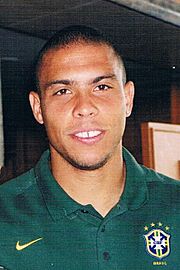
Brazil finally won another World Cup in 1994 in the United States. The team had strong players like Romário and Bebeto in attack, and captain Dunga in midfield. They beat Italy in the final after a penalty shootout. This was Brazil's fourth World Cup title, a new record.
In the 1998 World Cup, Brazil reached the final again. Star player Ronaldo scored four goals before the final. However, Ronaldo became unwell just hours before the final match. France, led by Zinedine Zidane, won the final 3-0.
Brazil won their fifth World Cup in 2002, held in South Korea and Japan. This team was powered by the "Three R's": Ronaldo, Rivaldo, and Ronaldinho. They won all their group games. In the knockout rounds, they beat Belgium and England. In the semi-final, they beat Turkey 1-0. Brazil then defeated Germany 2-0 in the final, with Ronaldo scoring both goals. Ronaldo was the top scorer of the tournament with 8 goals.
Brazil won the 2004 Copa América and the 2005 FIFA Confederations Cup. The team had a powerful attack with Ronaldo, Adriano, Kaká, and Ronaldinho.
Recent Years (2006–Present)
At the 2006 World Cup, Brazil won all their group games. They beat Ghana 3-0 in the next round, with Ronaldo breaking the record for most World Cup goals. However, they lost 1-0 to France in the quarter-finals.
Dunga became Brazil's coach in 2006. Brazil won the 2007 Copa América and the 2009 FIFA Confederations Cup.
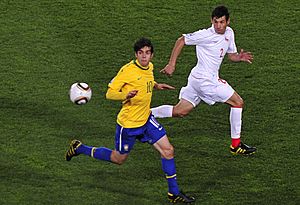
In the 2010 World Cup in South Africa, Brazil won their group and beat Chile in the round of 16. But they lost 2-1 to the Netherlands in the quarter-finals.
After some coaching changes, Luiz Felipe Scolari became coach in 2012. In June 2013, Brazil's FIFA ranking dropped to 22nd, their lowest ever. However, they won the 2013 Confederations Cup by beating Spain 3-0 in the final.
2014 FIFA World Cup
Brazil hosted the 2014 World Cup. They started well, winning their opening match against Croatia. They then drew with Mexico and beat Cameroon to reach the knockout stage. Brazil beat Chile in a penalty shootout in the round of 16.
In the quarter-final, Brazil defeated Colombia 2-1. But their star player, Neymar, suffered a back injury and could not play for the rest of the tournament. Brazil then lost a shocking semi-final match 7-1 to Germany. This was their biggest ever World Cup defeat. The match is known as the Mineirazo. Brazil also lost the third-place game 3-0 to the Netherlands.
Return of Dunga (2014–2016)
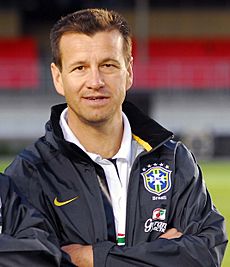
Dunga returned as Brazil's coach in July 2014. At the 2015 Copa América, Brazil was knocked out by Paraguay in the quarter-finals.
In the 2016 Copa América Centenario, Brazil was eliminated in the group stage for the first time since 1987.
2016–Present
Tite became the new manager in June 2016. At the 2018 World Cup, Brazil won their group and beat Mexico. However, they lost 2-1 to Belgium in the quarter-finals. Tite stayed on as coach.
He led Brazil to win their ninth Copa América title in 2019, beating Peru in the final. In the 2021 Copa América, Brazil reached the final again but lost 1-0 to Argentina.
At the 2022 World Cup, Brazil won their group. They beat South Korea 4-1 in the round of 16. But they lost to Croatia in the quarter-finals after a penalty shootout. After this, Tite resigned as coach.
In the 2024 Copa América, Brazil was eliminated by Uruguay in the quarter-finals after a penalty shootout.
Team Look
Uniforms
Brazil's first team colors were white with blue collars. After the 1950 World Cup loss, people felt these colors weren't patriotic enough. A newspaper held a competition to design a new kit using the four colors of the Brazilian flag. The winning design was a yellow jersey with green trim and blue shorts with white trim. This design was created by a 19-year-old named Aldyr Garcia Schlee. These new colors were first used in 1954 and have been used ever since.
The blue and white colors for the second kit came from the 1930s. They became the permanent second choice by accident in the 1958 World Cup final. Brazil's opponents, Sweden, also wore yellow. Brazil didn't have a second kit, so they quickly bought blue shirts and sewed their team badges onto them.
Nicknames
The Brazil national team has several nicknames:
- Canarinho: This means 'Little Canary'. It refers to a yellow bird found in Brazil.
- Amarelinha: This means 'Little Yellow One'.
- Seleção: This means 'The National Squad'.
- Verde-amarela: This means 'The Green and Yellow'.
- Pentacampeão: This means 'Five-time Champions'.
- Esquadrão de Ouro: This means 'The Golden Squad'.
Some people in Latin America call the team El Scratch or Scratch du Oro. FIFA's YouTube channel called them Samba Boys during the 2022 World Cup.
Training Camp
Brazil's main training camp is called Granja Comary. It is located in Teresópolis, about 90 km from Rio de Janeiro. It opened in 1987 and was updated in 2013 and 2014.
Recent Matches
Here are Brazil's match results from the last year and upcoming games.
Win Draw Loss Fixture
2024 Matches
| 6 September 2024 2026 FIFA World Cup qualification | Brazil |
1–0 | Curitiba, Brazil | |
| 22:00 UTC−3 | Stadium: Estádio Couto Pereira Attendance: 36,914 Referee: Facundo Tello (Argentina) |
| 10 September 2024 2026 FIFA World Cup qualification | Paraguay |
1–0 | Asunción, Paraguay | |
| 20:30 UTC−4 | Stadium: Estadio Defensores del Chaco Attendance: 31,962 Referee: Andrés Matonte (Uruguay) |
| 10 October 2024 2026 FIFA World Cup qualification | Chile |
1–2 | Santiago, Chile | |
| 21:00 UTC−3 |
|
Stadium: Estadio Nacional Julio Martínez Prádanos Attendance: 43,059 Referee: Darío Herrera (Argentina) |
| 15 October 2024 2026 FIFA World Cup qualification | Brazil |
4–0 | Brasília, Brazil | |
| 21:45 UTC−3 | Raphinha Pereira Luiz Henrique |
Stadium: Estádio Nacional Mané Garrincha Attendance: 60,139 Referee: Esteban Ostojich (Uruguay) |
| 14 November 2024 2026 FIFA World Cup qualification | Venezuela |
1–1 | Maturín, Venezuela | |
| 17:00 UTC−4 | Stadium: Estadio Monumental Attendance: 32,200 Referee: Andrés Rojas (Colombia) |
| 19 November 2024 2026 FIFA World Cup qualification | Brazil |
1–1 | Salvador, Brazil | |
| 21:45 UTC−3 |
|
Stadium: Arena Fonte Nova Attendance: 41,511 Referee: Piero Maza (Chile) |
2025 Matches
| 20 March 2025 2026 FIFA World Cup qualification | Brazil |
2–1 | Brasília, Brazil | |
| 21:45 UTC−3 |
|
Stadium: Estádio Nacional Mané Garrincha Attendance: 70,027 Referee: Alexis Herrera (Venezuela) |
| 25 March 2025 2026 FIFA World Cup qualification | Argentina |
4–1 | Buenos Aires, Argentina | |
| 21:00 UTC−3 | Stadium: Estadio Monumental Attendance: 85,015 Referee: Andrés Rojas (Colombia) |
| 5 June 2025 2026 FIFA World Cup qualification | Ecuador |
0–0 | Guayaquil, Ecuador | |
| 18:00 UTC−5 | Stadium: Estadio Monumental Isidro Romero Carbo Attendance: 59,283 Referee: Piero Maza (Chile) |
| 10 June 2025 2026 FIFA World Cup qualification | Brazil |
1–0 | São Paulo, Brazil | |
| 21:45 UTC−3 |
|
Stadium: Neo Química Arena Attendance: 46,316 Referee: Facundo Tello (Argentina) |
| 4 September 2025 2026 FIFA World Cup qualification | Brazil |
v | Rio de Janeiro, Brazil | |
| 21:30 UTC−3 | Stadium: Maracanã |
| 9 September 2025 2026 FIFA World Cup qualification | Bolivia |
v | El Alto, Bolivia | |
| 19:30 UTC−4 | Stadium: Estadio Municipal de El Alto |
| 10 October 2025 Friendly | Brazil |
v | TBD | |
| --:-- UTC+9 |
| 14 October 2025 2025 Kirin Challenge Cup | Japan |
v | ||
| --:-- UTC+9 |
| November 2025 Friendly | Brazil |
v | TBD | |
| --:-- UTC+9 |
Coaching Staff
| Position | Name | Ref |
|---|---|---|
| Head coach | ||
| Assistant coach | ||
| Goalkeeping coaches | ||
| Physical coach | ||
| Match analysts | ||
| Performance analyst | ||
| Physiologist | ||
| Doctor | ||
| Team coordinator | ||
| Sporting director |
Players
Current Squad
These players were chosen for the 2026 FIFA World Cup qualification matches in June 2025.
Player information is correct as of June 10, 2025, after the match against Paraguay.
| No. | Pos. | Player | Date of birth (age) | Caps | Goals | Club |
|---|---|---|---|---|---|---|
| 1 | GK | Alisson Becker | 2 October 1992 | 74 | 0 | |
| 12 | GK | Bento | 10 June 1999 | 4 | 0 | |
| 23 | GK | Hugo Souza | 31 January 1999 | 0 | 0 | |
|
|
||||||
| 2 | DF | Danilo | 15 July 1991 | 66 | 1 | |
| 3 | DF | Alexsandro | 9 August 1999 | 2 | 0 | |
| 4 | DF | Marquinhos (captain) | 14 May 1994 | 99 | 7 | |
| 6 | DF | Alex Sandro | 26 January 1991 | 42 | 2 | |
| 13 | DF | Vanderson | 21 June 2001 | 7 | 0 | |
| 14 | DF | Léo Ortiz | 3 January 1996 | 2 | 0 | |
| 15 | DF | Lucas Beraldo | 24 November 2003 | 4 | 0 | |
| 16 | DF | Wesley | 6 September 2003 | 2 | 0 | |
| DF | Carlos Augusto | 7 January 1999 | 2 | 0 | ||
|
|
||||||
| 5 | MF | Casemiro | 23 February 1992 | 77 | 7 | |
| 7 | MF | Gerson | 20 May 1997 | 14 | 1 | |
| 8 | MF | Bruno Guimarães | 16 November 1997 | 35 | 1 | |
| 17 | MF | Éderson | 7 July 1999 | 3 | 0 | |
| 18 | MF | Andrey Santos | 3 May 2004 | 2 | 0 | |
| MF | Andreas Pereira | 1 January 1996 | 10 | 2 | ||
|
|
||||||
| 9 | FW | Richarlison | 10 May 1997 | 50 | 20 | |
| 10 | FW | Vinícius Júnior | 12 July 2000 | 41 | 7 | |
| 11 | FW | Raphinha | 14 December 1996 | 34 | 11 | |
| 19 | FW | Antony | 24 February 2000 | 16 | 2 | |
| 20 | FW | Estêvão | 24 April 2007 | 5 | 0 | |
| 21 | FW | Matheus Cunha | 27 May 1999 | 15 | 1 | |
| 22 | FW | Gabriel Martinelli | 18 June 2001 | 18 | 2 | |
Recent Call-ups
These players have also been called up to the Brazil squad in the last year.
| Pos. | Player | Date of birth (age) | Caps | Goals | Club | Latest call-up |
|---|---|---|---|---|---|---|
| GK | Weverton | 13 December 1987 | 10 | 0 | v. |
|
| GK | Lucas Perri | 10 December 1997 | 0 | 0 | v. |
|
| GK | Ederson | 17 August 1993 | 29 | 0 | v. |
|
|
|
||||||
| DF | Guilherme Arana | 14 April 1997 | 13 | 0 | v. |
|
| DF | Murillo | 4 July 2002 | 1 | 0 | v. |
|
| DF | Gabriel Magalhães | 19 December 1997 | 14 | 1 | v. |
|
| DF | Alex Telles | 15 December 1992 | 12 | 0 | v. |
|
| DF | Abner | 27 May 2000 | 4 | 0 | v. |
|
| DF | Fabrício Bruno | 12 February 1996 | 2 | 0 | v. |
|
| DF | Douglas Santos | 22 March 1994 | 1 | 0 | v. |
|
| DF | Dodô | 17 November 1998 | 0 | 0 | v. |
|
| DF | Éder Militão | 18 January 1998 | 35 | 2 | v. |
|
| DF | Bremer | 18 March 1997 | 5 | 0 | v. |
|
| DF | Wendell | 20 July 1993 | 6 | 0 | v. |
|
| DF | William | 3 April 1995 | 0 | 0 | v. |
|
| DF | Yan Couto | 3 June 2002 | 4 | 0 | v. |
|
|
|
||||||
| MF | André | 16 July 2001 | 12 | 0 | v. |
|
| MF | João Gomes | 12 February 2001 | 10 | 0 | v. |
|
| MF | Joelinton | 14 August 1996 | 7 | 1 | v. |
|
| MF | Lucas Paquetá | 27 August 1997 | 55 | 11 | v. |
|
| MF | Oscar | 9 September 1991 | 48 | 12 | v. |
|
| MF | Lucas Moura | 13 August 1992 | 37 | 4 | v. |
|
| MF | Alisson Euler | 25 June 1993 | 0 | 0 | v. |
|
| MF | Matheus Pereira | 5 May 1996 | 1 | 0 | v. |
|
|
|
||||||
| FW | Rodrygo | 9 January 2001 | 33 | 7 | v. |
|
| FW | Endrick | 21 July 2006 | 14 | 3 | v. |
|
| FW | Savinho | 10 April 2004 | 13 | 1 | v. |
|
| FW | João Pedro | 26 September 2001 | 3 | 0 | v. |
|
| FW | Neymar | 5 February 1992 | 128 | 79 | v. |
|
| FW | Luiz Henrique | 2 January 2001 | 6 | 2 | v. |
|
| FW | Igor Jesus | 25 February 2001 | 4 | 1 | v. |
|
| FW | Bruno Henrique | 30 December 1990 | 2 | 0 | v. |
|
| FW | Galeno | 21 October 1997 | 1 | 0 | v. |
|
| FW | Yuri Alberto | 18 March 2001 | 1 | 0 | v. |
|
| FW | Samuel Lino | 23 December 1999 | 0 | 0 | v. |
|
| FW | Igor Paixão | 28 June 2000 | 0 | 0 | v. |
|
| FW | Pedro | 20 June 1997 | 6 | 1 | v. |
|
|
||||||
Team Achievements
Worldwide Titles
- FIFA World Cup
- FIFA Confederations Cup
 Champions (4): 1997, 2005, 2009, 2013
Champions (4): 1997, 2005, 2009, 2013 Runners-up (1): 1999
Runners-up (1): 1999
Continental Titles
- Copa América
- Panamerican Championship
- CONCACAF Gold Cup
Other Awards
- FIFA Team of the Year (13): 1994, 1995, 1996, 1997, 1998, 1999, 2000, 2002, 2003, 2004, 2005, 2006, 2022
- Laureus World Team of the Year (1): 2003
- FIFA World Cup Fair Play Trophy (4): 1982, 1986, 1994, 2006
See also
 In Spanish: Selección de fútbol de Brasil para niños
In Spanish: Selección de fútbol de Brasil para niños


